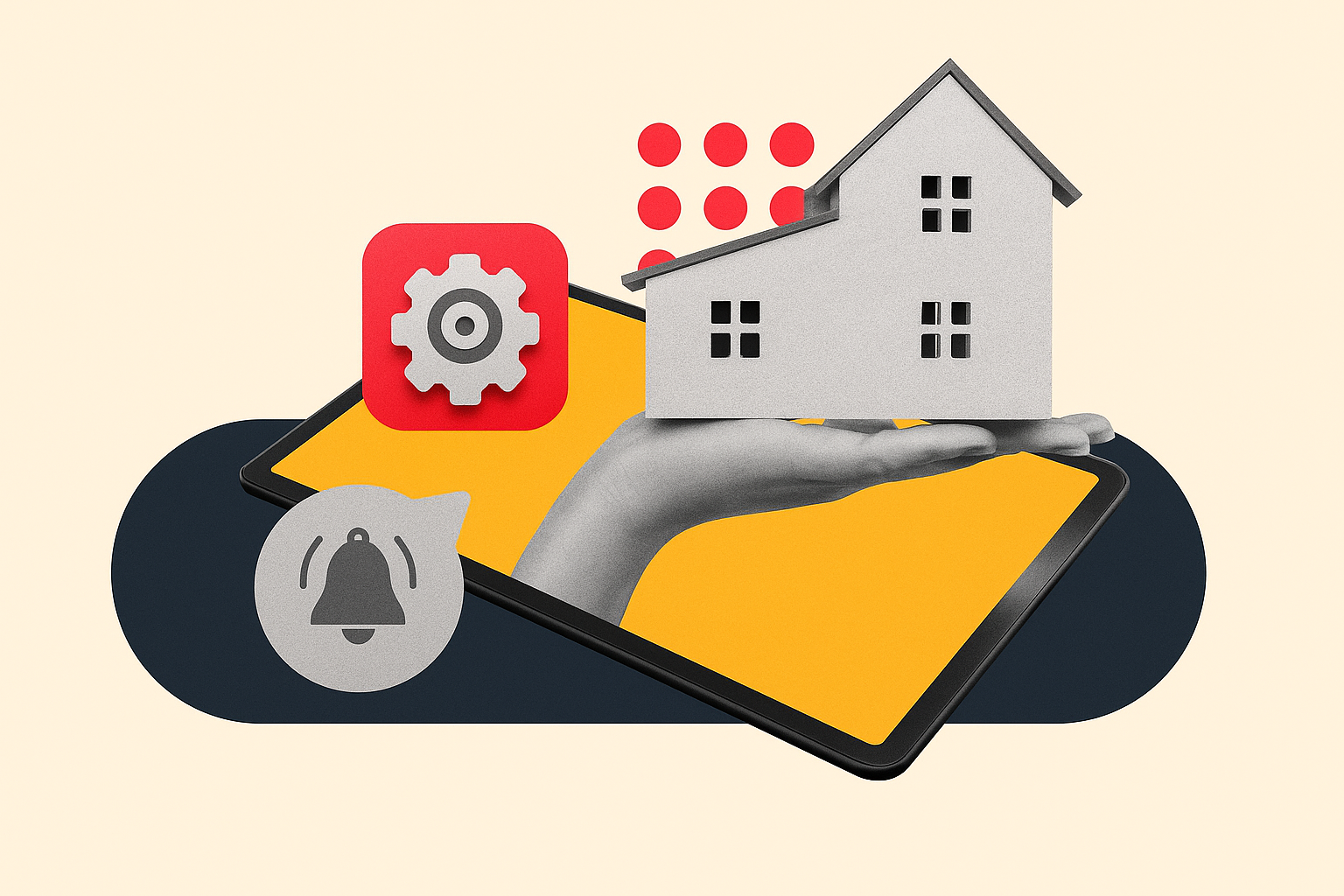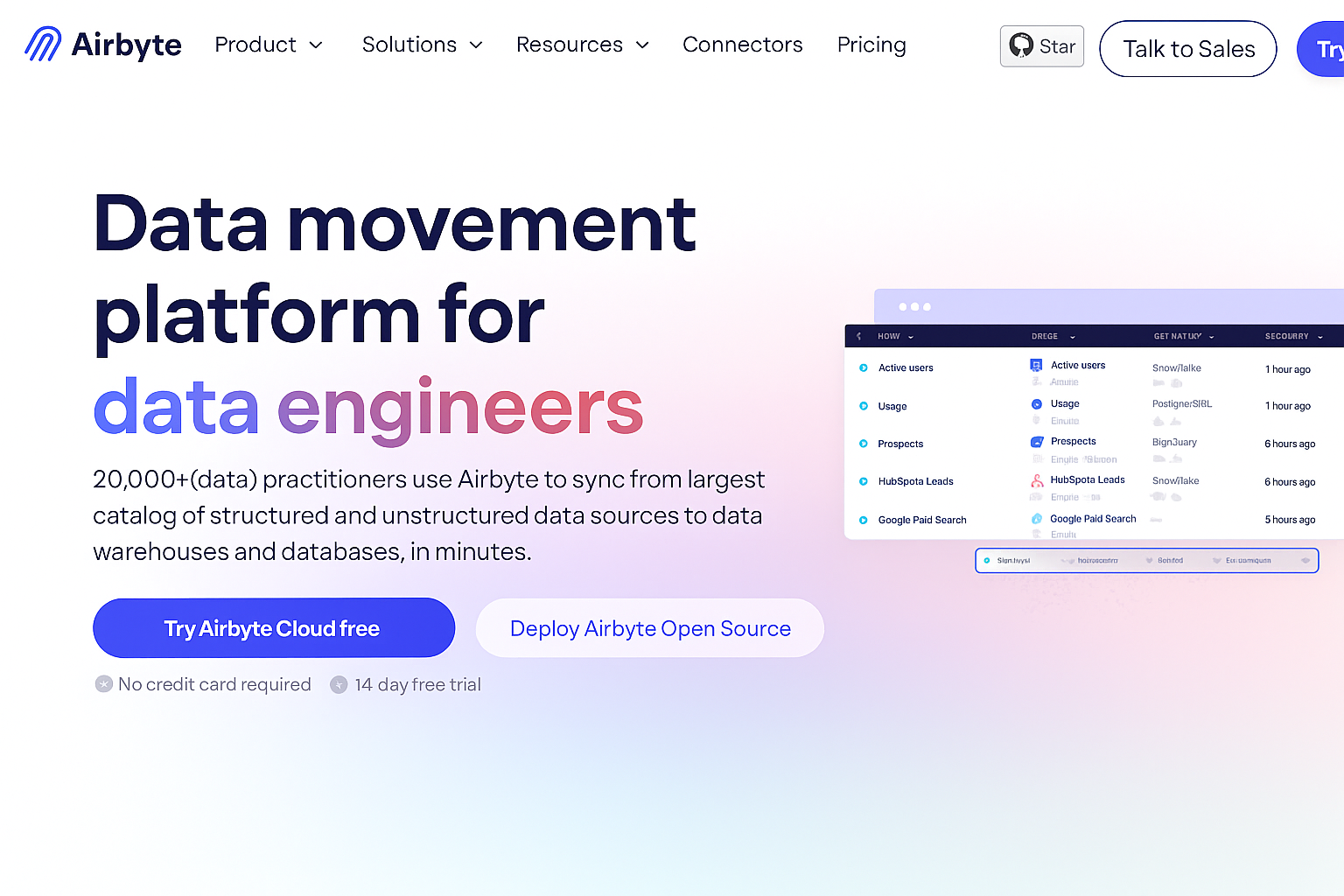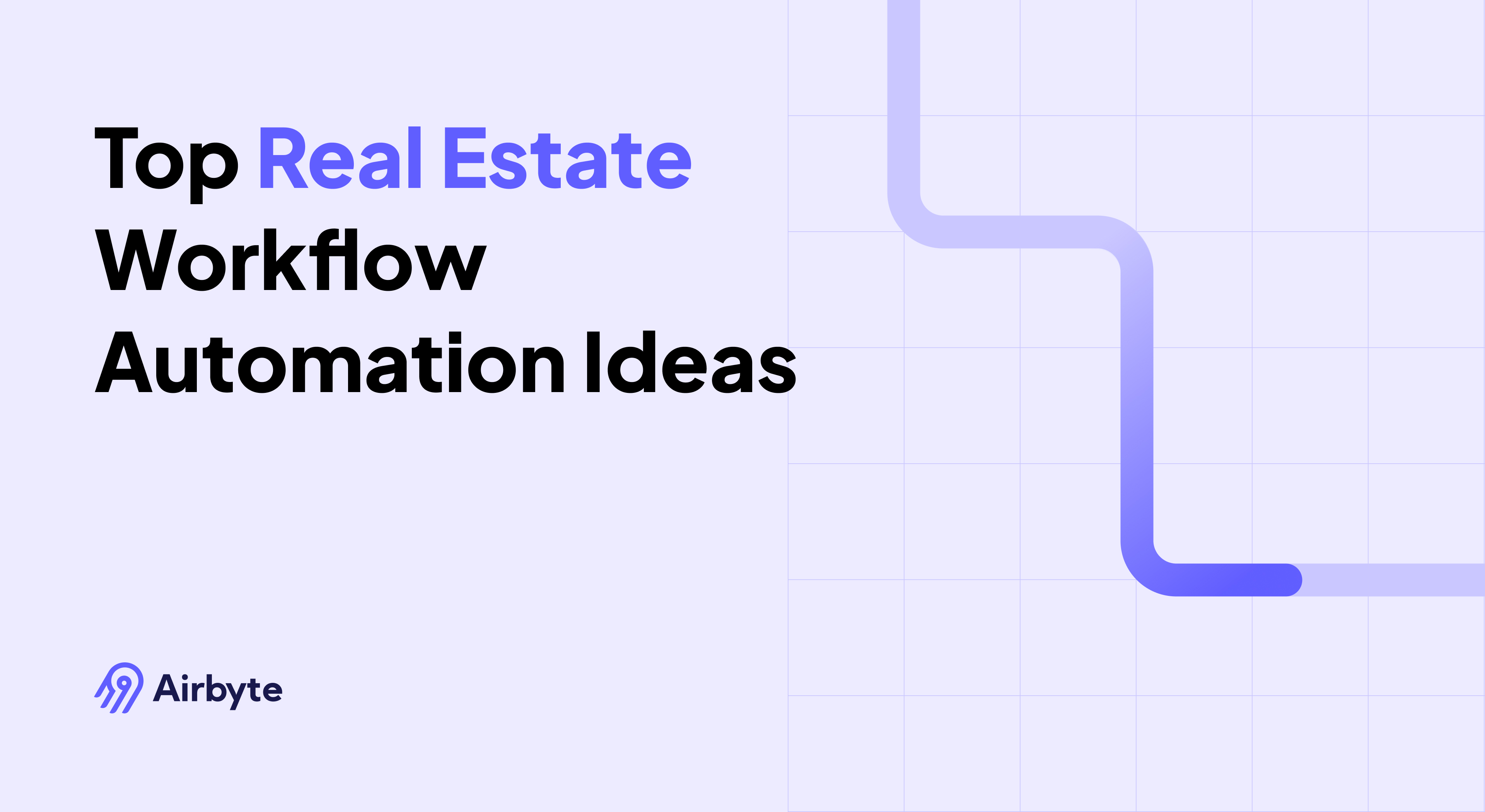20 Real Estate Workflow Automation Ideas to 10x Your Growth
Summarize this article with:
✨ AI Generated Summary
Real estate workflow automation streamlines complex tasks such as lead capture, document management, contract generation, and payment processing, reducing labor costs, errors, and response times while enhancing client service. Key strategies include AI-powered lead management, automated follow-ups, property listing syndication, and performance analytics, enabling scalable, efficient operations. Emerging technologies like AI, blockchain, and IoT further transform the industry, with platforms like Airbyte providing robust data integration and security for comprehensive automation.
Running a real-estate business involves multiple complex workflows, from promoting sellers' land, buildings, or housing properties to attracting buyers or renters. Handling these workflows manually can be time-consuming, error-prone, and lead to burnout. As your business scales, relying solely on manual processes becomes less feasible.
To overcome these challenges, consider using real-estate workflow-automation tools. They reduce workload, save time and resources, and help your business level up. This article explains the benefits of real-estate workflow automation and explores top ideas for implementing it effectively.
What Is Real Estate Workflow Automation and Why Does It Matter?

Real-estate workflow automation uses technology to streamline routine tasks so you can focus on clients and other areas that need personal attention. Modern automation platforms have evolved from simple task-management systems to sophisticated, AI-powered ecosystems that integrate with diverse business applications.
The convergence of AI, IoT sensors, and advanced analytics is fundamentally reshaping how professionals manage everything from initial client inquiries to transaction closings. These technologies enable real estate professionals to handle more clients while maintaining high service quality.
How Does Real Estate Workflow Automation Benefit Your Business?
Automates Repetitive Tasks
Automation handles tasks such as lead generation, sending SMS or emails, and scheduling appointments with minimal manual intervention. Advanced platforms can now process documents, lease abstractions, and contracts with increasing accuracy.
Decreases Labor Costs
By automating time-consuming tasks, you can operate efficiently with a smaller team, reallocating resources to higher-value initiatives. This cost reduction allows you to invest more in client relationships and business growth.
Streamlines Processes
Automation integrates tasks into smooth, continuous workflows, eliminating bottlenecks and ensuring data consistency across systems. This integration creates a seamless experience for both your team and clients.
Reduces Human Error
Automated validation and cross-checking minimize data-entry mistakes, leading to more reliable outcomes. This accuracy is particularly important in real estate transactions where errors can be costly.
Provides Faster Response Times
Tools such as AI-powered chatbots deliver instant replies, schedule viewings, and provide property info 24/7. Quick responses help you capture leads before competitors can respond.
24/7 Business Operations
IoT-enabled property-management systems monitor security, energy, and building operations in real time, allowing round-the-clock service. This continuous monitoring ensures properties are maintained and secure at all times.
What Are the Most Effective Real Estate Workflow Automation Strategies?
Here are some practical ideas for real estate workflow automation:
1. Automated Lead Capture

A lead is a potential client interested in buying, renting, or investing in property. Manually collecting leads from various channels, such as social media, organic search, and offline sources, might miss opportunities. To prevent this, implementing a lead generation solution that automates capture is essential for efficiency and accuracy. It allows you to consolidate leads into a single source, ensuring zero lead leakage and maximizing revenue.
Modern lead capture systems integrate with multiple touchpoints including website forms, social media platforms, and property listing websites to create comprehensive prospect databases. These systems can automatically qualify leads based on predefined criteria, assign them to appropriate agents, and trigger personalized follow-up sequences based on lead source and behavior patterns.
2. Follow-up Reminders
Effective follow-ups are crucial for building strong client relationships. Automation can significantly enhance this process. By setting up automated reminders, you can ensure timely follow-up without manual efforts. For instance, automated emails can be aligned after property viewing or for client retention.
Advanced follow-up systems can analyze client interaction patterns and automatically adjust communication frequency and content based on engagement levels. These systems ensure that high-priority prospects receive immediate attention while comprehensive nurturing sequences maintain engagement with longer-term prospects.
3. Personalized Email Drip Campaigns
Sending generic emails results in low engagement and a failure to connect with leads on a personal level. Implement personalized email drip campaigns—series of automated emails sent to clients based on specific actions like subscribing to a mailing list. You can customize the email timings to suit your business needs, either by setting a fixed schedule or adjusting it based on user interactions.
Machine learning algorithms can now analyze user behavior patterns to predict optimal send times and content preferences, creating highly personalized communication experiences that drive significantly higher conversion rates than traditional mass marketing approaches.
4. Property Listing Syndication
Listing syndication is the process of distributing a property listing across multiple online real estate marketplaces at once. Manually posting a list of properties on multiple real estate platforms is time-consuming and prone to inconsistencies. Automating listing syndication ensures consistent visibility and frees up your time to focus on more strategic tasks.
Modern syndication platforms can automatically update property status across multiple channels in real-time, preventing clients from inquiring about unavailable properties while ensuring maximum market exposure without manual coordination efforts.
5. Document Management
As a real estate professional, you must be managing high volumes of documents, including contracts, property listings, client information, and more. Manually handling these documents can cause disorganization and a lot of paperwork, making it difficult to retrieve important files quickly. Workflow automation will help you centralize your documents and ensure that they are easily accessible when needed.
Advanced document management systems now incorporate AI-powered processing capabilities that can automatically extract key information from contracts, leases, and legal documents while maintaining comprehensive audit trails and version control for compliance purposes.
6. Contract Generation
Manual contract creation increases the risk of errors and delays in deals. When contract generation is automated, you can quickly produce contracts tailored to specific clients. This speeds up the deal-closing process and reduces the likelihood of mistakes.
Smart contract technology is beginning to automate the entire transaction process by encoding agreed-upon terms into blockchain-based programs that execute automatically when predetermined conditions are met, potentially revolutionizing how real estate transactions are structured and executed.
7. Rent Collection and Payment Processing
Rent collection and payment processing require a significant amount of administrative workload. Automating this process can streamline operations by sending out reminders when payments are due, expediting payment processing, and offering multiple payment options.
Modern payment processing systems can automatically handle complex rent calculation scenarios including prorated amounts, late fees, and payment plan adjustments while maintaining accurate financial records and providing real-time reporting capabilities.
8. Lead Management
Inefficiency in handling the growing number of leads may result in missed follow-ups or affect reaching the targeted audience. Workflow automation in real estate can help categorize and prioritize leads effectively, ensuring each receives the attention it deserves.
AI-powered lead scoring systems can analyze user behavior patterns, engagement levels, and communication history to predict conversion probability and suggest optimal contact timing, ensuring that sales efforts focus on the most promising opportunities.
9. Opportunity Tracking
Opportunity tracking focuses on your most promising leads—those who are aware of your company and are interested in purchasing property. By leveraging workflow automation, you can monitor important deals and their progress. Such automation can help you stay on top of your sales pipeline and focus on critical opportunities at the right time.
Advanced tracking systems provide real-time visibility into deal progression while automatically identifying potential risks or delays, enabling proactive intervention to maintain transaction momentum.
10. Lead Activity Monitoring
Without real-time insights into lead activities, you may lose crucial engagement moments, reducing the possibility of successful conversions. Workflow automation helps monitor lead activity by tracking interactions and receiving notifications for significant actions. You can then engage with leads quickly whenever they revisit your website or interact with your email.
Behavioral tracking systems can identify subtle engagement patterns that indicate buying intent, enabling sales teams to prioritize their efforts and respond to opportunities at optimal moments in the customer journey.
11. Task Management
Task management involves tracking and coordinating the various responsibilities of your team members related to property listings, client interactions, closing deals, or documentation. An automated system helps you complete all necessary tasks on or before deadlines, delivering a better client experience.
Comprehensive task management platforms can automatically generate and assign follow-up activities based on client interactions while providing team members with prioritized task lists and deadline alerts that ensure nothing falls through operational cracks.
12. Automated Negotiation
In your real estate business, you may have to handle complex deals that require expert negotiation. Using workflow automation software, you can deliver updates to buyers about the level of competition in the negotiation. This keeps both buyers and sellers informed about property prices in real-time.
Advanced negotiation platforms can analyze market data and transaction history to provide data-driven pricing recommendations while maintaining transparent communication between all parties throughout the negotiation process.
13. Accounting and Financial Automation
You might handle accounting processes using paper or traditional spreadsheets. These processes are time-consuming, and if an error occurs, it can lead to financial loss. With real estate automation software, you can streamline invoice processing, payment accuracy, and financial report creation and analysis. In addition, built-in validation checks allow you to detect and fix inaccuracies promptly. With real estate accounting software, you can simplify these tasks further.
Modern financial automation systems can automatically categorize expenses, reconcile accounts, and generate comprehensive financial reports while ensuring compliance with industry regulations and tax requirements.
14. Two-Way Data Sync
In the real estate business, it is essential to ensure that all your platforms are always up-to-date and in sync with the latest information. Manually updating the property status (available, under contract, on hold, or sold) between different systems can result in costly errors and poor decision-making. Two-way data sync helps you automate this process by replicating near-real-time updates across all platforms.
Advanced synchronization systems can handle complex data relationships and business rules while maintaining data integrity across multiple platforms, ensuring that all stakeholders always have access to current and accurate information.
15. Video Engagement
To engage clients with video content, you should upload it to each platform, manually share the video link or embed it in emails, and track the engagement. These manual processes can limit your outreach. Automating the sharing of video content—like virtual tours or property walkthroughs—will save you time while enhancing your marketing efforts. Using a video API, you can upload, optimize, and stream your real estate marketing videos effortlessly, ensuring only high-quality content reaches your platforms without the manual overhead. If you're using print campaigns, adding a video QR Code makes it easy for clients to access videos while allowing you to track engagement through analytics. Using the best QR code generator ensures dynamic tracking, editable links, and performance insights, helping you measure which properties are generating the most offline-to-online engagement.
Virtual and augmented reality technologies now create immersive experiences that adapt in real-time based on user behavior and preferences, fundamentally changing how potential buyers interact with properties before making purchase decisions.
16. Automated Voicemail Messages
Calling each client can be time-consuming, and missed calls can result in lost opportunities to connect. Real estate workflow automation allows you to send pre-recorded voice messages about property updates, market trends, offers, and more to multiple clients simultaneously. This ensures that your message is delivered without spending hours on the phone.
Voice-activated interfaces and natural language processing are emerging as significant trends in real estate automation, enabling more intuitive interaction with automated systems while providing more natural user experiences for both agents and clients.
17. Automated Property Inspection
Property inspection can be tedious, but technology can help complete the process faster. End-to-end inspection software helps you capture comprehensive details of every property surface, allowing buyers to track its condition and accelerate maintenance. This eliminates the need to spend hours arranging and completing inspections.
Drone technology applications are transforming property inspections and due diligence processes through comprehensive aerial data collection and analysis, capturing structural details invisible from ground level while reducing post-purchase surprises.
18. Agent Availability
Managing team availability and scheduling appointments can be challenging when done manually. When you sync your real estate automation software with a calendar, you will get an updated view of your agents' availability. This allows clients to view agent availability and book appointments accordingly.
Intelligent scheduling systems can now analyze agent workloads, client preferences, and geographic factors to optimize appointment scheduling while maximizing both agent productivity and client convenience.
19. Performance Analytics
Automation software can enable you to gain performance analytics on property values, market trends, and investment opportunities. You can easily monitor business metrics to make smart business decisions, optimize client experience, and improve profitability.
Predictive analytics powered by machine learning algorithms can forecast market trends, identify optimal pricing strategies, and predict maintenance requirements, enabling proactive rather than reactive business management approaches.
20. Automation in Property Development Projects
Property development represents one of the most complex applications of real estate workflow automation, requiring coordination across multiple stakeholders, regulatory bodies, and project phases. Automation in property development encompasses project management systems that track construction milestones, permit applications, and compliance requirements while coordinating with design software, construction management platforms, and financial tracking tools.
Modern development automation platforms can automatically generate regulatory submissions, track approval status, and coordinate construction schedules while maintaining comprehensive audit trails for compliance purposes. These systems integrate with building information modeling software to create digital twins of development projects that enable real-time monitoring and predictive maintenance scheduling throughout the construction lifecycle.
The financial complexity of property development projects makes automation particularly valuable for managing budgets, cash flow projections, and investor reporting. Automated systems can track construction costs against budgets, generate investor updates, and coordinate draw requests while maintaining detailed documentation for compliance and audit purposes.
What Common Misconceptions Hinder Automation Success?
The Human-Replacement Fallacy
Automation complements rather than replaces agents; it frees them for high-value activities like negotiation and relationship-building. The most successful real estate professionals use automation to enhance their capabilities rather than replace human interaction.
Cost & Scale Misconceptions
Scalable, tiered, and no-code platforms make automation accessible to solo agents and small teams, not just large enterprises. Many automation tools offer affordable pricing structures that provide immediate ROI.
Generic-AI Limitations
Industry-specific solutions outperform generic AI by understanding real-estate terminology, document formats, and compliance requirements. Specialized tools deliver better results because they're designed for real estate workflows.
Which Emerging Technologies Are Transforming Real Estate Automation?
AI & Machine-Learning Integration
Predict property values, optimize pricing, and generate listings automatically with generative AI. These technologies analyze market data to provide accurate valuations and create compelling property descriptions.
Blockchain & Smart Contracts
Automate property transfers, reduce intermediaries, and enable fractional ownership through tokenization. Blockchain technology increases transparency and security while reducing transaction costs and processing time.
Internet of Things & Smart Buildings
Sensor networks enable predictive maintenance, energy optimization, and real-time monitoring of building systems. IoT integration provides valuable data for property management and enhances tenant satisfaction.
How Does Airbyte Enable Comprehensive Real Estate Data Integration?

Airbyte's 600+ pre-built connectors move data from property-management systems, CRMs, marketing tools, and financial apps to your preferred warehouse or lake. This comprehensive integration capability enables real estate professionals to create unified data ecosystems that power advanced analytics and automation.
Key highlights include generative-AI workflows with vector-store ingestion for intelligent document processing. Airbyte provides robust data pipelines and integrations that support RAG workflows using LangChain and OpenAI, enabling the development of sophisticated property search and recommendation systems in downstream applications.
The platform offers dbt-powered transformations for clean, reliable data pipelines and PyAirbyte for programmatic pipeline development. Change-data-capture functionality ensures real-time synchronization across all systems.
Airbyte maintains open-source flexibility while providing enterprise-grade security features including TLS/HTTPS encryption, SSH tunneling, role-based access control, and ISO 27001 and SOC 2 Type II compliance. This security framework makes it suitable for handling sensitive real estate transaction data.
Conclusion
Integrating workflow-automation tools lets real-estate businesses operate smoothly, scale faster, and deliver superior client service. By adopting the strategies outlined above, you can cut labor costs, reduce errors, and differentiate yourself in a competitive marketplace. Successful implementation hinges on selecting solutions that align with your objectives, deploying them in phases, and maintaining strong change-management and security practices. The future of real estate belongs to professionals who embrace automation as a competitive advantage.
FAQ
What are the best real-estate workflow-automation tools?
Dotloop, Propertybase, and Follow Up Boss are leading options, offering document processing, lead management, and client-communication features. These platforms provide comprehensive solutions for different aspects of real estate workflow automation.
How do I implement real-estate workflow automation?
Start by segmenting leads into hot, warm, and cold categories. Build specific strategies for each segment and map the buyer journey to identify automation opportunities. Align your social posts, landing pages, and emails with your goals, then track KPIs and iterate continuously based on performance data.
How do I choose the right automation tool?
Prioritize core functionality, ease of use, integration breadth, scalability, and security compliance capabilities. Consider your specific business needs, team size, and technical requirements when evaluating different platforms.
What common mistakes should I avoid?
Avoid assuming automation replaces humans entirely, as it should complement your team's efforts. Don't skimp on change management when implementing new systems, and avoid relying on generic AI for specialized real estate tasks that require industry-specific knowledge.
How can automation help property-development projects?
Automation streamlines project management, regulatory submissions, scheduling, budgeting, and investor reporting while maintaining detailed audit trails. This coordination ensures projects stay on track, meet compliance requirements, and maintain transparent communication with all stakeholders.

.webp)
